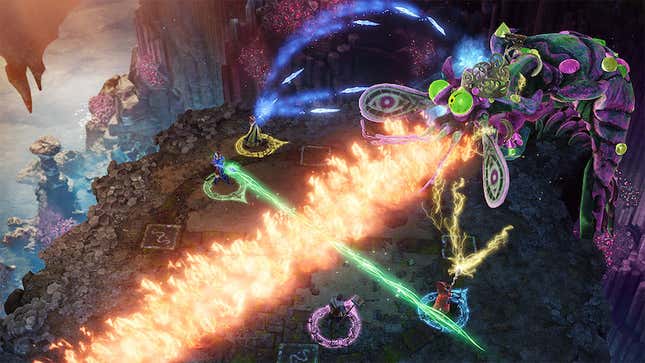
I don’t know about you, but social distancing guidelines have changed how I play games. I’m lucky—or unlucky, depending on the day—to live with three other people. On one hand, I’ve been able to play a lot more couch co-op (like, a lot more). On the other, well, I’ve been able to play a lot more couch co-op. Over these weeks of forced non-isolation, I’ve gone through a bona fide MasterClass on the do’s and don’ts of being a good local co-op partner.
Couch co-op is a different beast than online. When you’re playing video games across a vast gulf of 1s and 0s, you can mute your partner when they’re being annoying. You can quit out of a game and blame it on a faulty connection. You can overall just be a jerk and dodge accountability like you work in the White House. (Please don’t, though.) But in local co-op, your actions have immediate repercussions.
To steal a phrase from every marriage counselor and BU comms grad worth their salt, communication is key. If you grew up with siblings, have lived with multiple roommates, gone through the parenting gauntlet, or are otherwise a fairly agreeable individual, all of the following advice might seem obvious to you. For everyone else, read on.
Set aside your pride.
Forget about high scores and personal bests. Focus less on your individual glory and more on the bigger picture: that you’re in this together.
Take a game like Wizard of Legend, the 2018 dungeon-crawling roguelite. At the end of each level, you’ll see a breakdown of your performance. It’s a sum of many factors, including how much damage you dealt, how much damage you received, and how any enemies you killed. But the picture is crystal clear: Whoever earns the crown did the best.

Now, let’s say your partner earned the crown. In the next stage, you don’t need to, I don’t know, wait until your co-op partner is within range of an explosive barrel and then fire off a spell, causing an explosion that will certainly hurt them in the name of petty revenge. If you must settle the score, take it to the PVP arena. Many games with co-op options have some sort of competitive mode, too.
Keep it down.
If you’re going face-to-face with a friend, watch your noise levels. It’s no secret that video games, especially competitive ones, inspire all manner of reactions. Just as you’d (hopefully) try not to scream into your mic, don’t shout in your friend’s face. Your neighbors—and any roommates or family members not playing at that moment—will thank you for keeping things down.
Also, try not to flail too much. The last thing you want to do is to kick over your friend’s mango White Claw in a fit of frustration.
Establish a loot law.
With loot-based games, it’s imperative to set boundaries. (There’s another word of advice lifted from counselor scripture for you.) The loot-shooting Borderlands series—Borderlands 3, in particular—serves as a solid template. In the most recent entry, you can set loot drops to “coopetition,” which creates one shared drop for all players, or “cooperation,” which spawns drops unique to each player.
But you can also take matters into your own hands and hammer out who gets what. You could treat loot as a free-for-all, heavily favoring teammates with better reflexes. You could also designate certain situations—boss chambers, chests—and treat those as grounds for discussion. Everything else? Fair game.
Whatever the case, agree on it beforehand, and be sure to come up with some reasonable punishments for those who run afoul of the law and grab everything in sight. (You’ll have to decide the severity on your own.)
No matter the game, be sure to follow the Golden Rule of loot law: Never, ever, ever grab loot if one of your teammates is down and needs to be revived. Sure, you might have first crack at that shiny legendary rifle. But rest assured, your partner won’t forget the time you chose loot over love. The next time you need an assist, will they be as willing to extend a helping hand?
Designate roles and responsibilities.
Plenty of multiplayer games have predetermined roles: One person’s the medic, one’s the sniper, one carries the hilariously large gun, and so on. It’s easy enough to know who’s doing what in these games. It becomes more difficult to assign jobs when everyone has access to the same moveset.
An isometric spell-casting game, like Magicka or Nine Parchments, might give players access to the same, or at least starkly similar, movesets. It’s fun to have everyone on fireball-hurling duty, but, as MOBA fans and Overwatch players can attest, things will go way smoother if you have one person running around casting healing spells, making sure everyone’s HP is in tip-top shape.

Even a silly game like last week’s terrific Moving Out works best when everyone has an assigned role. You can let all players run around of their volition, aimlessly moving packages. Or you could think about it holistically. Have one person tackle all the small items. Have two people handle the sofas, the beds, the refrigerators, and the other heavy loads. And have one person helping out where needed, but mostly sticking by the truck, keeping furniture tidy and organized. (Yes, Moving Out is a lot like Moving In The Real World.)
When it comes to actually assigning roles, you can have a conversation like an adult and decide who’s on what. You could also draw straws, play rock-paper-scissors, or flip a coin.
While you’re at it, make at least a conscious effort to play a game everyone can enjoy. Maybe someone in your household doesn’t feel like playing a shooter. That’s fine. Boot up something lighter, like Box Boy + Box Girl or Uncooked 2. Maybe your co-op partners are craving something with a competitive edge. Find a team-based game; Super Mario Party even has a mode that pits two two-person teams against each other, which can simultaneously scratch both the co-op and PVP itch.
Some rules for single-player “co-op” games
You’d be forgiven for thinking couch co-op is relegated to the realm of multiplayer games, but who among us hasn’t played a single-player game with a friend? If you want to keep the experience as smooth as possible, keep these guidelines in mind.
Choose the right genre. A vast, open-world role-playing game like The Witcher 3 is far more trying to tackle with a friend than a tightly woven Naughty Dog game. It’s far easier to pass a controller back and forth when there are preset plot beats and natural ebbs in level design.
Play a game where the occasional breather is welcome. The recent Doom games are a blast. They’re also exhausting. For hyper-intense games like that—games where you don’t realize you’ve been holding your breath until you’ve cleared the room—pass the controller back and forth. Your hands can only sweat so much!
Set fair limits. Playing a single-player game with a friend only works if you approach your play time equitably. Maybe that means passing the controller at the end of every level or mission, or at checkpoints. Maybe it means swapping upon every death. Whatever you do, try to be mindful of how much time each person spends holding the controller. Otherwise, you might as well just watch a “Let’s Play.” (Of course, be flexible about sheer stupidity and first-minute slip-ups. Everyone deserves a restart.)
Agree on even the smallest decisions. I don’t know a whole lot about parenting, but I imagine sharing a character with a friend is a lot like co-parenting. Decide who your character is together. When you have a skill point to allot, make sure you both like the skill (or agree that it levels up the character in an agreeable direction). Same goes for inventory management: When upgrading gear, make sure it’s a decision you’re both cool with. And for the love of gil, don’t sell off 25 Phoenix Downs without asking first.
Don’t run out of batteries.
This is pretty much only advice for a certain subset of Xbox One owners, but hey, going to CVS for a pack of AA batteries is far more of an ordeal these days. Stock up ahead of time!